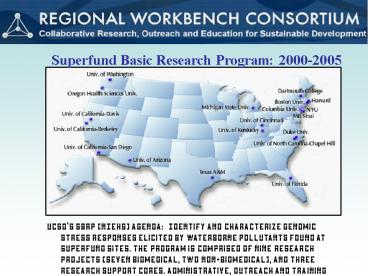Superfund Basic Research Program: 20002005 - PowerPoint PPT Presentation
1 / 27
Title:
Superfund Basic Research Program: 20002005
Description:
Multidisciplinary conceptual framework for sustainability science ... Sustainability science. New regionalism/institutionalism and globalization ... – PowerPoint PPT presentation
Number of Views:78
Avg rating:3.0/5.0
Title: Superfund Basic Research Program: 20002005
1
Superfund Basic Research Program 2000-2005
UCSDs SBRP (NIEHS) Agenda Identify and
characterize genomic stress responses elicited by
waterborne pollutants found at Superfund sites.
The program is comprised of nine research
projects (seven biomedical, two non-biomedical),
and three research support cores. Administrative,
Outreach and Training Cores are also included.
2
Driven by increasingly influential legislation
and agreements at the European and International
levels, sustainable development has, since the
late eighties, emerged as one of the core
elements of planning policy and practice. The
metropolitan or "city-regional" scale is now
widely regarded as the most appropriate scale for
strategic planning. AESOP 2004 CONGRESS
Metropolitan Planning and Environmental Issues
(France, July 1-4).
3
Regional Science and Technology for
Sustainability Workshops
Africa Nov. 13-15, 01 Abuja, Nigeria
Asia Feb. 4-6, 02 Chiang Mai, Thailand
Europe Feb. 27-March 1-6, 02 Bonn, Germany
Latin America March 4-6, 02 Santiago, Chile
Integration and Synthesis May 21-24, 02 Mexico
City, Mexico
N. America March 24-25, 02 Ottawa, Canada
Series of regional workshops around the world
designed to broaden and deepen an agenda for
science and technology for sustainability.
Network for Science and Technology for
Sustainability Corell, Robert. 2002
4
(No Transcript)
5
- RWBC Mission
- Create innovative research-learning partnerships,
planning support systems, and educational tools
to enable sustainable city-region development. - More than a Web site!
- Multidisciplinary conceptual framework for
sustainability science - Federated network for information integration
and knowledge sharing, through collaborative
projects - Service learning and workforce development
opportunities for students (internships) - Ethics, research methods and the philosophy
of science (guides)
6
Book Projects 2000-2006
7
- Frontiers of Regional Ecology
- Sustainability science
- New regionalism/institutionalism and
globalization - Information, visualization communications tech.
- Ethics and the philosophy of science
Cross-fertilization across these fields is a
vital intellectual and practical task essential
to sustainable development.
8
The National Academies National Academy of
Sciences National Academy of Engineering Institute
of Medicine National Research Council Calls for
the development of Integrative Science,
science committed to bridging barriers that
separate traditional modes of inquiry.
9
Identifies four interlocked, components of
sustainability science Highlights the REGION as
the most amenable geographic scale for
integrating theory and practice
Source National Research Council (1999) Our
Common Journey A Transition Toward
Sustainability.
10
San Diego- Tijuana City-Region
Over 300 city-regions around the world have 1
million or more inhabitantsThe US-Mexico Border
region has 14 rapidly growing twin-cities
11
(No Transcript)
12
San Diego-Tijuana City-Region
Sustainability Science New Regionalism Infor
mation Visualization Technology Ethics and
Env. Justice
13
(No Transcript)
14
The U.S.-Mexico border region is shared by two
nations, ten states (four in the U.S. and six in
Mexico), and 64 municipalities (39 in Mexico and
25 in the U.S.). There are 26 U.S. federally
recognized Native American tribes in the border
region, which range from 9 to 17,000 members.
15
May 29, 2003 RWBC EXPO
16
University of California, San Diego _ Superfund
Basic Research Program_ Urban Studies and
Planning Program San Diego Supercomputer Center
Center for U.S.-Mexican Studies SIO,
Cal(IT)2, Libraries, Medical School San Diego
State University Graduate Program in City
Planning Department of Geological Sciences-
Ed.Center on Computational Science and
Engineering Mexican Academic Institutions
CICESE COLEF (El Colegio de la Frontera
Norte) Non-profit organizations TELESIS- San
Diego Baykeeper, and Ja Jan Coalition- San Diego
River Park Foundation- Conservation Biology
Institute- Association of Collegiate Schools of
Planning - Global Planning Educators Association
Network Government Agencies INFORMATICA (A
Municipal GIS Institute of Tijuana) SANDAG,
County of San Diego, City of San Diego San
Diego Regional Water Quality Control
Board Industry Industrial Environmental
Association (IEA)- Earthstar Geographics, Solid
Terrain Modeling
A Federated Network of Partners
17
RWBC hosting SANDAGs Regional Planning
Committee, May 5, 2003
18
Credit SIO Geological Data Center, Regional
Workbench, CICESE, CREATE
19
(No Transcript)
20
(No Transcript)
21
(No Transcript)
22
(No Transcript)
23
(No Transcript)
24
Federated project data base BiosphereHydrosph
ereLithosphereAtmosphereHumans as
components of ecosystems
25
(No Transcript)
26
- Wealth of City-Regions
- (prospective areas of collaboration with the
BCSD) - Watershed-based approaches to water quality
management - Biological diversity and land conservation
- Environmental management systems, innovation and
industrial ecology - Ecotoxicology and public health
- Housing, infrastructure and community-development
- Regional comprehensive planning and planning
support systems
27
- REGIONAL WORKBENCH CONSORTIUM (RWBC)
- http//www.regionalworkbench.org
- Multimedia documentaries and bilingual
interactive narratives - http//www.regionalworkbench.org/education/narrati
ves.php - Colonia 10 de Mayo, Tijuana, Mexico (2002,
UCSD-TV 6022 20 min.) - The Regional Workbench Consortium (2003, UCSD-TV
7244 28 min.) - Tijuana River Watershed (2003, bilingual
narrative) - Working Papers http//www.regionalworkbench.org/e
ducation/publications.php - Keith Pezzoli kpezzoli_at_ucsd.edu































